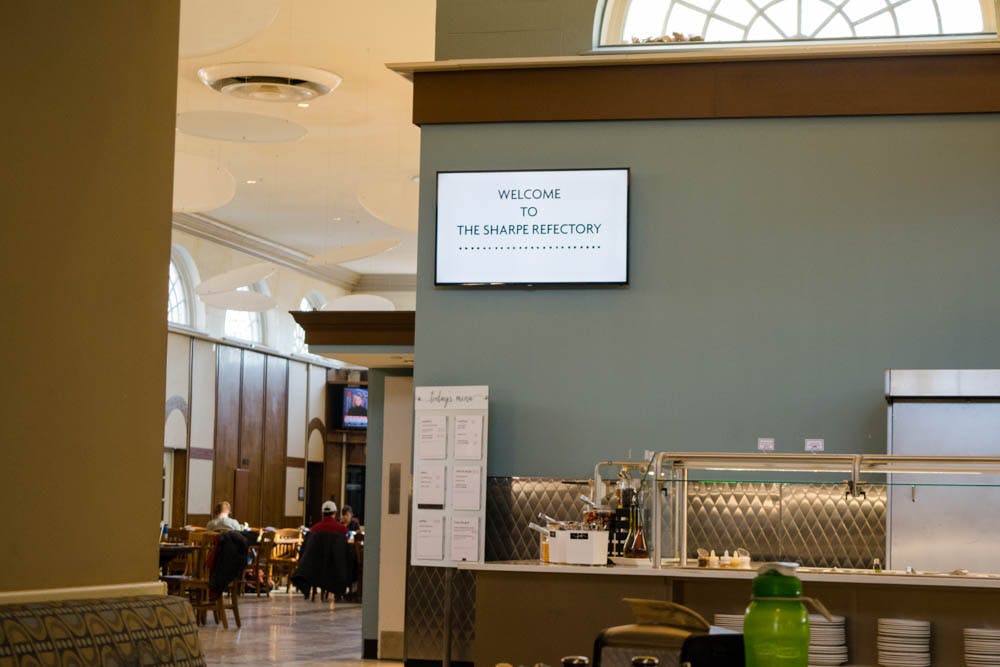Ten current and former Brown Dining Services student employees have opted-in to the collective civil action lawsuit against the University filed Jan. 24, according to Richard Sinapi, principal attorney at Sinapi Law Associates, who is representing the plaintiffs. Eight other students have expressed interest as of Feb. 5, Sinapi added.
The lawsuit alleges that the University violated the Rhode Island Payment of Wages Act and the Fair Labor Standards Act “by failing to pay wages and overtime wages,” which would entitle the plaintiffs to compensation, The Herald previously reported.
“The lawsuit is seeking reparations for unpaid on-call hours,” wrote Eugenie Boury ’20, an assistant unit manager at Andrews Commons, in an email to The Herald.
The University is reviewing the complaint filed by the plaintiffs and “will respond as appropriate through the legal process,” The Herald previously reported.
Maxwell Kozlov ’20, a lead plaintiff, estimates that more than 60 students are eligible to take part in the lawsuit. Current and former supervisors, assistant unit managers and unit managers who worked “on-call” and were not compensated appropriately, are eligible to join the collective action class, according to the complaint.
The employment contracts that supervisors signed this fall in the carts, cashiers and Blue Room units included weekly “on-call” shifts, according to documents obtained by The Herald. While they were “on call,” carts supervisors were required to “be on campus, with (their) supervisor card and in dress code so that (they) can emergency (substitute) if needed,” cashier supervisors were required to “respond to communication … within a timely manner” and unit mangers were expected to be available to respond to “urgent needs of (their) unit,” according to the positions’ respective employee agreements.
The Herald spoke to five of the students eligible to participate in the collective action alongside Kozlov and Benjamin Bosis ’19, the other lead plaintiff.
Three of those students — Katherine Jiménez ’20, a carts unit manager, Alec Brown ’19, a former cashiers supervisor, and a former member of the student management team who requested anonymity for fear of professional repercussions — are among those who plan to join the lawsuit. They believe BuDS took advantage of them and that they are owed compensation for time they spent “on call.”
“There was a systemic effort to underpay us,” the former member of the student management team said, adding that this effort “is not only unacceptable, (but) it must be corrected. It represents a threat to low-income students.” The “threat must be eliminated through class action lawsuits,” he added.
“Personally, there’s so much pain and trauma from on call, so many hours taken from me that I’ll never get back,” Jiménez said. “I spent a year or so having my time being taken from me without my consent.”
“It was just a cycle of abuse and exploitation, and it just really wasn’t okay,” she said. “And I think I deserve compensation for that.”
However, not all the students eligible for the lawsuit have similar experiences under Dining Services. Mathilde Barland ’21, a Blue Room assistant unit manager, stated that “there are parts (of the lawsuit) I agree with and some I feel don’t apply to me.” The agreement for Blue Room supervisors, assistant unit managers and unit managers was less demanding in terms of expectations for “on-call workers,” Barland said. “Yes, I had on-call hours, but I didn’t have to be in dress code, ready to go” like other units did, Barland said. Furthermore, the Blue Room unit gave supervisors 30 minutes to come to work when they were called in, which allowed for more flexibility for those “on call,” Barland added.
A source who requested anonymity for fear of professional repercussions agreed that the Blue Room unit provided more flexibility for students in leadership positions.
“I love my job and have never had an issue with on call,” the source wrote in an email to The Herald. “Was it at times stressful? Yes. But I signed up for the job of supervisor knowing full well about the conditions and time commitment that would be asked of me and never felt like any of this interfered with my ability to be a student.”
The student and Barland are still unsure whether or not they will choose to join the lawsuit. “If I can get paid for the on-call hours, I’ll take the money,” Barland said. “But it’s not truly money I deserve, because (while on call) I’d be with my friends, doing homework.”
Dining Services has since eliminated these shifts and “created a voluntary readiness list for students to accept or decline a request to work outside of scheduled work hours,” Vice President for Communications Cass Cliatt wrote in an email to The Herald. This new system is one of many changes Dining Services has made in recent months, The Herald previously reported.
The origin of the term and practice of “on call” in BuDS is unclear. “The students were provided latitude in designing practices to effectively recruit, retain and manage student dining workers,” wrote Brian Clark, director of news and editorial development, in an email to The Herald. “In their guides and handbooks relating to their work at BuDS, Dining Services student workers described the manner in which student workers would be sought to fill open work shifts at certain Dining Services units,” Clark wrote.
This practice has been an “expectation” for student workers for many years, the former member of the student management team said. While he is unaware of who created the original supervisor and unit manager agreements, “multiple people had access to the sheet that was titled ‘the on call sheet,’” including Dining Services administrators. “Not only did they use this document, they referenced it repeatedly in communications,” he added. “The execution (of on-call), and the reason for its existence were all put upon us by management as far as I can tell.”





